Editor's Note: This interview was conducted in February of 2022.
– Hello, in November on Twitter you were ranked second in the ranking of top 6-max regs. In the comments to our review, you wrote that it went well for you. Was it really a memorable month?
– There was a lot of NL40k play on GG and ACR. But it is important to clarify that we were talking about active players. And in November, for some reason, many elite players did not play. Linus returned, but he was just getting into the swing of things. In fact, it was precisely those who were included in this list who played actively, and "Oshpil" (a top Russian cash game player) and I – more than anyone else. I was doing very well, and in such periods you play better.

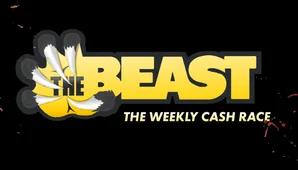
– Was it a game with "ImagineKing"?
– No, it happened before. There is a famous American player, his nickname on GG is "ripperjohnes". This is a live reg, he plays well, but he doesn’t reach the NL40k level. Likes to play in deep stacks. He first won a lot on ACR, and went from 10BB to 2,000BB. And there is such a system that it is impossible to reset the stack, and at some point, he had more than $800k. Then he lost a lot but managed to withdraw something. And, apparently, he liked the online game so much that he decided to return to GG and actively played all month. Moreover, he organized long sessions of 6-12 hours, playing at two tables. He had the best month of my career, winning about $400k.
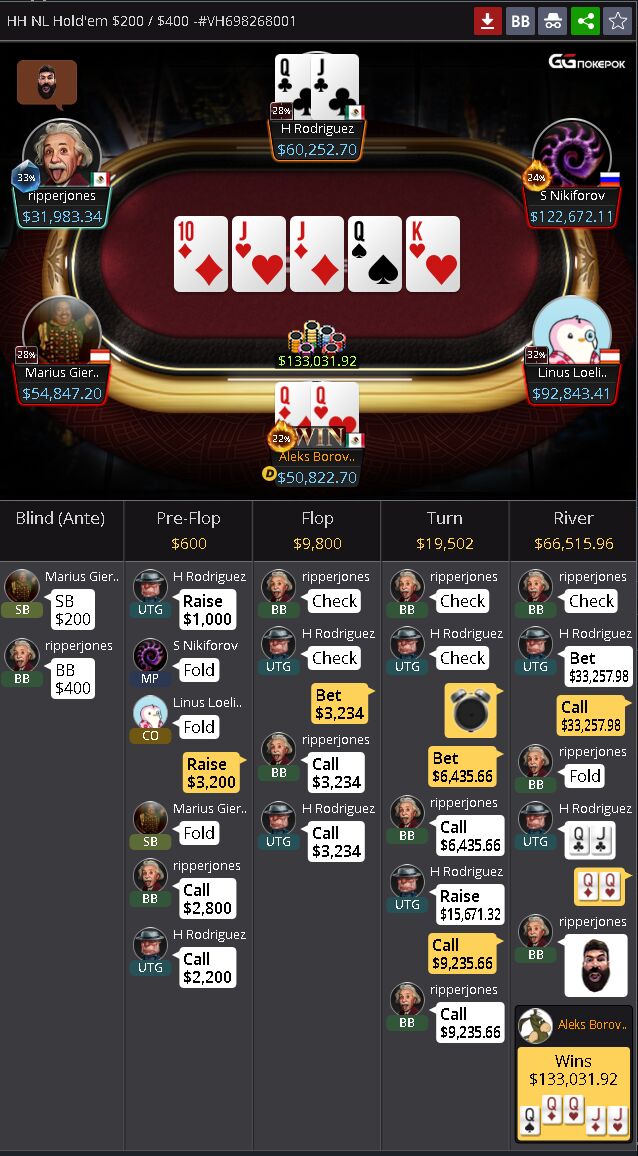
– What causes the effect that you start playing better when you feel good? Psychology?
– Poker is a very complex and difficult game. It’s really easier to get in shape and get a feel for the metagame when you deal well and there are no hard decisions in every hand, you don’t have to guess all the time and make expensive decisions. When you are unlucky and get into a bad run, it immediately hits the game very hard. Even a very strong player with a strong game can be broken.
I also wanted to say why I agreed to the interview in the first place. I've been playing poker for a very long time, for 11 years. And I've been playing exclusively cash games my entire poker life. I know the era very well, let’s call it “after forhayley ”. Little was said or written about it, but it is actually very interesting and I have something to tell about Russian-speaking players. I wanted to somehow record this for history.
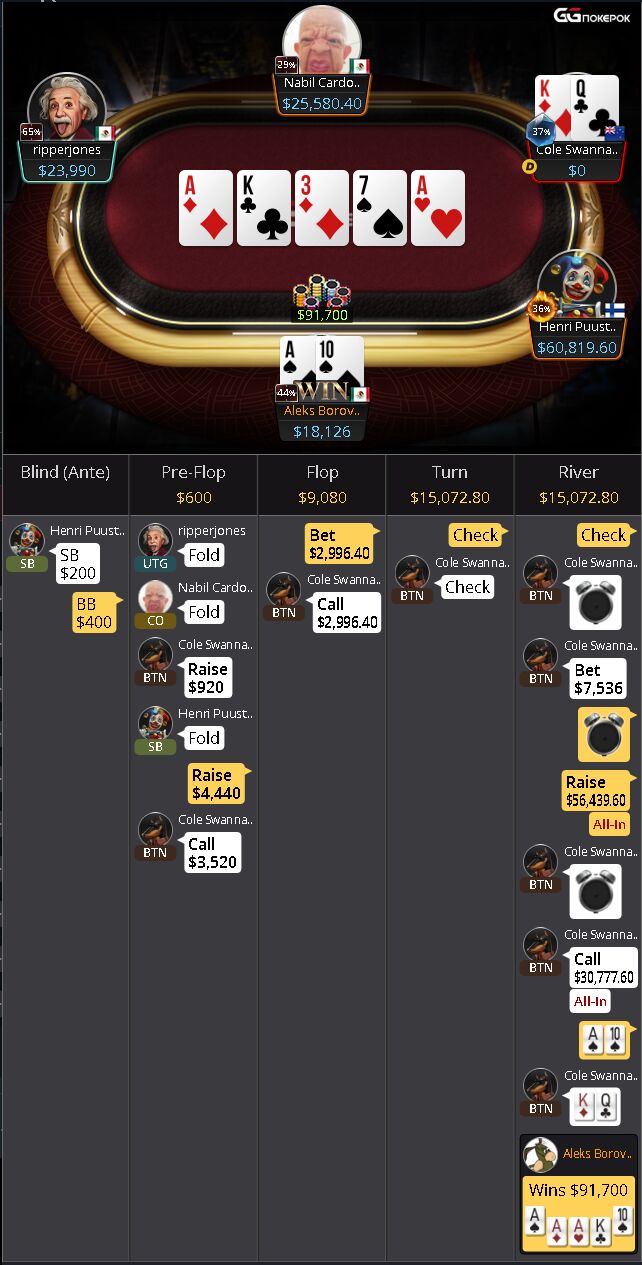
– Yes, we will definitely discuss it. But since we started with GG, I also wanted to ask about this incomprehensible Austrian "BIEDERMEIR". Didn't you try to get to his table, or was that unrealistic?
– It seems like it’s already clear that this is (Leon) Tsoukernik. It suits both the gaming style and the nickname that is associated with it. I also got to play with him. A couple of months ago he sat down to NL40k, but then he played more or less well. We played for two hours, the table did not come together, and he left with a profit. And now, two months later, he returned... It’s clear that I would happily play such a game, even completely on my own. I almost never sell shares, it has a bad effect on my game. So the outing would be a little risky, but I would convince myself.
– In the summer of 2020, a big game with Chinese and MTT players was going on for a long time on the same tables, it seemed to be easier to get there. Why didn't you play there?
– That game was very expensive, there were many tables of NL200k with antes. The squad was really up to par, but I was always a very careful player. This can be seen in my game and in my approach to it. That game objectively did not suit me either in terms of bankroll or level. Although it was not suitable for many participants, this did not bother them.
– Did you immediately understand the level of that game or did you take a closer look and somehow analyze it?
– I have a very good tune of things. In general, almost any regular high-stakes player can very accurately estimate his expectations at the table. There were many other related factors – where to find $2 million for such a game, how to deposit it, and how to withdraw it later. This topic was almost never raised, but GG only recently raised the cashout limit to $50k at a time, and before that, this amount had to be withdrawn for a month. I'm talking about the Russians; Europeans have never had such a problem. Another format with straddle and ante, not really my kind of game. I have a huge profit of 100bb.
– How did your career begin? When did you learn about poker?
– I must say that I started playing at the age of 17. But you shouldn't do that. At this age, we have little understanding of what we are doing. Moreover, it was even easier then, but now all this contextual advertising has appeared, which is aimed at not the smartest people; it also has a very strong influence on teenagers. Underage gambling is a big problem. Therefore, now I would strictly not recommend starting early.
– Did you start right after school?
– Yes. I lived in Moscow and only understood the rules of ordinary 5-card draw poker. I didn’t even know what hold’em was, but poker seemed to be looking for me. I don't know how to explain it. For example, instead of prep courses for college, my friends and I went to a computer club, and there, people sat and played on Full Tilt. I watched from behind but didn’t understand anything. I sometimes came across broadcasts with Ilya Gorodetsky and watched them too. Around the same time, an interview with Ivan Demidov was published in some regular magazine, where they published a TV program for the week. I played Warcraft, and the interview also mentioned something about the game. My father saw this and brought it to me: “Look, a guy just like you won a lot of money.” In general, poker has always revolved around me.
And he himself started playing actively on the ProDota forum. In 2010, there was a separate topic about poker, where many famous Russian players wrote – Anatoly "Dykalis" Zyrin, Alexander "C3" Paigusov, Antokha, Vyacheslav "1nvoker" Ozhigov. Everyone helped each other, and in general, there was a great atmosphere. Warmonger McCain is also from there, he later had a blog on the GipsyTeam forum, he is my first teacher. Anatoly "Dykalis" Zyrin played full ring and filled SNE, in that thread he constantly posted charts and wrote detailed reports. Against this background, I also decided to try it and everything turned out very quickly. I found out about PokerStrategy and found a bunch of open training sessions and other useful information there. Training was much simpler then than it is now. Today there is enough information, but it is very difficult to understand whether it is good or not. There is a lot of information garbage, and you don’t know what to do with it all. It’s much more difficult for a beginner to start than it was then. And then everything was simple – there was little information, you just went to PokerStrategy and followed the articles and open lessons.
Actually, that’s how my journey began. By the way, recently my friend, who now plays low limits, was re-reading all my posts to find something interesting and sent me a link to a post from 2011, where I ask about some kind of freeroll in the comments of a WPT broadcast. I got promoted from freerolls.
– So you didn’t even receive the starting fifty dollars?
– Could not. I was not yet 18, and there I needed a passport. I couldn’t ask my parents either; my father and mother are engineers. They would immediately understand that something is wrong. Back then there were very good freerolls on Full Tilt, they went on every day, almost every hour. Gradually I scraped together $100 and went to NL2.
– At what limit did you win your first significant money?
-- My whole career has been going very smoothly. Serious earnings also began with that topic on ProDota. Some of the players from there organized a group that is still running, although 11 years have passed. I still keep in touch with some from ProDota. Some people are already done with poker, but we still keep in touch. Warmonger was also in this conference, and at that time he was considered a very strong NL400-600 reg. I don’t remember the details, but for some reason, I became his student for a percentage of the profit, although this was not accepted then. I didn’t know how to play at all, I was sitting at NL5, and he gave me some training. I have vivid memories of how ashamed I was to go to the next training session because I didn’t win anything and had nothing to pay with. And I played all night to win something.
In the end, he helped me and I learned something. I lived with my parents, there were absolutely no expenses, and they even gave me some pocket money. I earned $200-300 a month on NL5, played tournaments, and saved up some kind of bankroll. I played everything then, as usually happens when you don’t know how to play anything.
I gradually decided that I would study exclusively cash games. I took training sessions and analyzed hands. I've always done a lot of work outside of my desk, constantly participating in many different conferences. And then they were recruiting people all the time – a conference of NL20, NL50 regs, and so on. I tried to get through everywhere, went to reviews, and hobbled up to NL50, and there the serious money began – expecting $1,500-2,000 a month if you play actively. And I played a lot, because I didn’t do anything else besides poker.
– Didn’t go to college?
– I got in but dropped out in my first year. If I wanted, I could even pass the test, but my family didn’t demand this from me, and I already had money to live on. I also have two sisters, a big family, and no one cared a little about me. Now I don’t know whether to say thank you to my parents or vice versa, haha. My father and I discussed my future, I said that I was confident in the result and asked to try for one year. He took it well. And I started making good money even faster.
– You say that you played a lot. What was the average length then?
–It takes a lot of time, but I never chased the number of hands and played few tables. The maximum was 40k-50k hands per month, then zoom appeared and there were more. I have always been exposed to the authority system, reading all the famous blogs – Dmitry "forhayley" Yaskevich, Mikhail "Inner" Shalamov, Ferwell (Editor's note: Ferwell's identity is still unknown), and so on. Inner had a famous post where he wrote that a professional cannot play less than 10 tables. And Ferwell wrote a refutation that, on the contrary, he never played more than four. Throughout my entire career, I also never played more than six, I tried to play with quality and think about every decision. This is one of the reasons why I like to play 100BB, in such depth, you can sit and think. I made sure that there was always a high win rate. Actually, this is how it was for me throughout my career – more than 5-6bb even during periods of stagnation. Overall, this is a pretty standard story for those years.
The most important thing is that I always went hand in hand with other strong players. Jay "Jayser" Sergey and I have been climbing together since NL25 and have worked over 1,000 hours, maybe even 2,000. At that time there were no solvers yet, and we analyzed opponents and hands based on logic, trying to understand what strong regs were doing. My growth in limits was very smooth, that is, I never had any game-changing revelations. A critical knowledge base simply accumulated, and I broke through the limit. Every next 20,000 hands I played better and better. So I reached reasonable limits – NL200-400.
– Never fired big shots either?
– No, but I had periods when I thought I was playing to my bankroll, but in reality, it was not so. Moreover, this was when substantial money was already being played out. Up to NL1,000 I was quite conservative, there were always 40-50 buy-ins. You also need to understand that back then it was fashionable to play one room. I switched from Stars to 888 and got into the reg 888 conferences. There I met Maxim "angryogr", and we also started working on the game. Within a year I very quickly skyrocketed from NL200 to 2k. In those years, if your win rate on 888 was less than 10bb, then you didn’t know how to play at all...
– Why was it customary to play one room, was there enough play?
– No, there wasn’t much play at all. Because of this, Maxim could play NL200 and NL5k at the same time. Now it sounds funny and stupid, but then it was the standard.
I quickly climbed the limits, Jayser and Antokha climbed in parallel with me, Maxim climbed a little earlier, but he also contributed to my progress.
It was a very interesting time. Forhayley has always been my idol, I read his blog to pieces, and I re-read it at least three times. And for me, this is one of the most vivid memories of my entire career, and I still managed to play with him. I just came to NL5k, and he was already finishing, we met at 888, where he played under the nickname "HellToSell". I remember now that he called threes against me on the SB after raising early. The cache regs will understand that something is wrong here.
– People often talk about his blog. What was its benefit specifically for strong regulars? He didn’t reveal any strategy.
– This is a classic success story of how a man from the very bottom became a millionaire. He completed the game and described his path in vivid language. Nowadays, this probably doesn’t exist in poker anymore; the entertainment component is being popularized more. And then it was just competition. Can be compared with the biography of Andre Agassi in tennis. Motivation is probably the wrong word here, his blog gave him some kind of dream of becoming a cool player. Forhayley became a great player from scratch.
– Why did Forhayley become an example and even an idol for many regulars of those years? There were many players of comparable level.
– Just because of the blog and publicity. He has an excellent style, he writes really very well. It's like reading a good book and empathizing with the author. You see all his difficult periods, battles with K10clubs – how he posted screenshots, where at first he lost, but then he still won. You follow successes, get upset together because of failures, and rejoice at achievements.
– Was he really the top when he left? As Truteller described it.
– It depends very much on the form of the game, everything is too undulating. At the end of his career, Forhayley could certainly have a positive expectation with his A-game at his peak against any opponent. Whether this could continue at a distance is highly unlikely. This is hard to understand for players who don't play cash games, but even elite regs' A-game is very different from the average. Some have less, some have more, but any player will have this. For example, Stefan "Stefan11222" Burakov’s A-game is incredibly strong, I think it’s by far the best in the world. But you can’t say the same about the middle one. Truteller's words are rather a tribute. And it is right. Forhayley is a cult figure.
But in Russian poker, there are actually a lot of them. Just after Forhayley left, a very interesting period began. Probably, first of all, this concerns 1nvoker and Antokha. At that moment, both were incredibly strong players. 1nvoker is also a classic path to success, perhaps even cooler than Forch’s. It’s just that 1nvoker writes worse, is less public, and his character is not the simplest. Few people know that he played 500k-1 million hands at NL2-10. He made his way through the jungle from the very, very bottom. What is it like to play a million hands at NL5? People don't play that much in their entire career. Definitely, no one else played so many hands at these limits, especially those who later reached NL20k. The Invoker passed each limit with sweat and blood.
– Couldn’t beat the micro-limits for a long time or what is the reason?
-- He was winning, but he lived off his poker earnings. Why, let's say, did I go quickly? Because I lived with my parents, they fed me, I had a place to sleep. And 1nvoker lived on the money he won, and this had a very strong impact. He is a unique player and a true poker story. It seems to me that even among foreign regs there are no similar examples. Peak 1nvoker is an incredibly powerful exploit.
And Antokha was very strong technically. At the peak of his form – 2015-16 – he played incomparably. Opponents were afraid to bet on the river because a raise would definitely follow and it was unclear what to do. He easily went beyond the ranges, the game was very brave and, I would say, juicy. He was not at all afraid to play expensive and very light hands, and he did it very well. He sensed his opponents well. But having an incredible level of play at that time, Antokha never received either a bankroll or recognition. Due to an injury, he was out for a whole year and was unable to return. When you don’t feel the game, your strengths become your weaknesses, going beyond ranges are immediately punished, and you begin to underestimate your opponents.
Now Antokha is retired, he is doing well. 1nvoker returned to poker and plays medium limits. At the peak, both were the second wave of the Red Army, they fought with everyone in a row at NL10k Stars and so on. The first is Forhayley, Katya Grishakova, and Mikita "fish2013" Badziakouski.
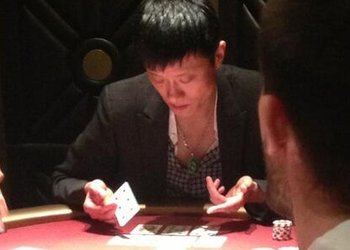
– Did Roman "ICEMAN2710" Voronin keep to himself?
-- He’s probably already the third wave.” And he is a rare example of a player who left at his very peak. Perhaps he will not be happy with my words, but in my opinion, he played much weaker than 1nvoker and Antokha. However, his results were much better. This sometimes happens, after all, the distances at these limits are not that great. But Voronin knew how to leave on time, this cannot be taken away from him. I beat everyone with my 20bb/100 and just finished.
Of the foreign regs, you can't ignore Jonas "Red_Baron" Mols. He had a crazy advantage over the field. Absolutely everyone learned from his game – me, the second wave of the Red Army... and Baron really was the best teacher, because his game was as far as possible from any solvers and GTO. His actions were very smart and logical. I suspect he has an IQ of 200, the game logic is just crazy. We analyzed his hands and in the end, we understood what he was trying to achieve. It is a rarity. He has already finished playing. Last year I came back and tried to play GTO-oriented, but the results were not very good. Probably there is no motivation and he doesn’t really need it. I played 15,000 hands in a year, it’s not serious. And at that time, Baron was at the top, because he made crazy game adjustments. Many of the concepts he came up with are still used today as basic concepts.
– How did you learn from his playing?
– They sorted out the hands mercilessly. He would play a session, and we immediately analyzed it in detail – what he did preflop, analysis of filters, everything in a row. Back then there was still a zoom tracker, you could even get these hands and watch the showdowns.
– Did the regwars with him give you anything in terms of development? What was your purpose in playing them anyway?
– We played 3-max in 2016. I had ambitions, I still have them, but then they were at the maximum. This was preceded by several successful years in a row – 2014-15 were incredibly successful. At NL2k on 888 there was a crazy amount of money back then. This was the maximum limit that could be played from a phone, so even at NL5k there was not such a good game. There was a player called "Railer888", a legendary amateur who lost several million. But on NL2k it is quite difficult to do this. I managed to earn a comfortable bankroll in these games. I received 100 buy-ins for NL5k quite early, in 1915. After that, I wanted to test my strength. But I already had experience with regwars before, I played a lot with Andres "Educa-p0ker" Artinano, and I also saw his rise very well. He played a lot of NL2k on 888 and always held the tables. We've played tens of thousands of hands, which is a lot for regular players. And I had good results with it. True, for him, this was the lower limit, and he did not play at the limit of concentration. I saw his mistakes.
As I already said, good results always inspire you, you begin to believe in your abilities. I played for two years without any negative months at all and took my famous trip to Stars, where I decided to compete with Baron and Fish [Mikita Badziakouski]. Why not? I made money but didn’t win the lottery. I thought that I could compete, and I had something to show. I had some preparations, I analyzed Baron in detail and formed ideas on how to pump up my game and do what he didn’t like. He could make subtle folds and his play was quite neat. That is, I had ideas on how to beat him. There was always room to maneuver at 100BB, and the game often got even deeper. And for me, it didn’t even end so badly; in a few months, I first won $100k, then gave $80k back.
In general, I always understood very clearly what I was doing. This is probably my strong point too. Not the technical part, but the approach to the game. I started the session and sat down to compete in regwars. For this reason, he could even close the table with a good amateur. Because in such lineups I enjoy the game, I try to outplay my opponents, I have a huge wall of notes for everyone, and I come up with something all the time. And there were sessions when I didn’t feel like regwaring at all; at such moments it was better to sit and fish. It was also good for the image, everyone knew that the person was fighting for the tables and often gave it to the lobby. I alternated between regular sessions and regular sessions; I didn’t like to combine them. This is another strong point – not playing regwars when there are many tables open. If there were two tables of heavy regwars, then I played only them and tried to show my best.
– How big is the role of studying in regwars?
– Huge. The variance in these games is always crazy. But not only that. Sometimes you start a reg war as an underdog, it works out well for you, you get in shape, correct your mistakes, and become a favorite. Well, if it goes well for you, it means it’s bad for your opponents, they lose the thread of the game and start making mistakes. This is an absolutely classic situation when the favorites in the regwars changed during the match. There are countless players who entered the elite games in this way – "prot0", Luke "Bit2Easy" Reeves, and partly even Linus Loeliger, no matter how loud it may sound. When I first started playing, let’s just say there were questions about his game. This is a basic situation where variance affects not only who wins money, but also the final balance of power.
– Are you saying that you rose smoothly up to NL5k, that is, there were no problem periods at all?
– There were, rather, periods of stagnation. When zoom first appeared on Stars, I was planning to go somewhere for the summer. But my father said that I could live in the country and work there calmly. I lived in a country house for three months with poor internet, I couldn’t do anything except poker. There was no way to even watch a stream or series. And all three months I went through Zoom training, mixed at 2bb. This can be called a small period of stagnation, although it raised the technical level of my game. Then I switched to 888, and there were no longer any special streaks. They appeared later, before NL2k I took off in just a year, and then NL5k was already close.
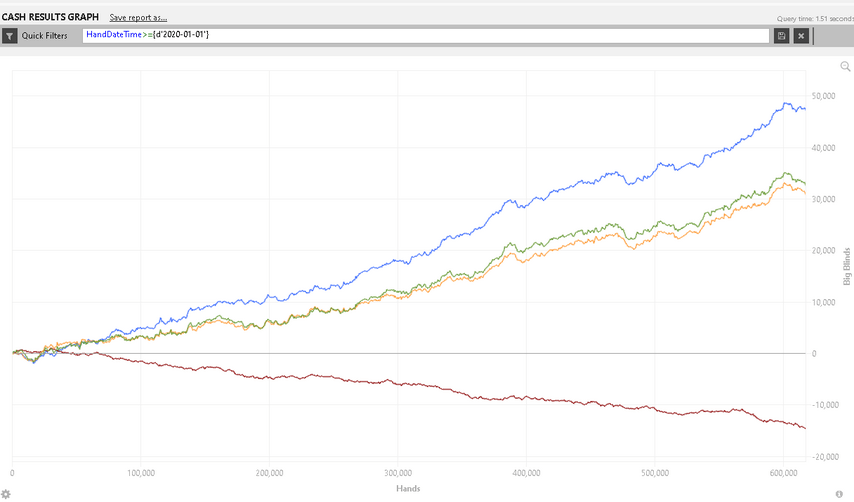
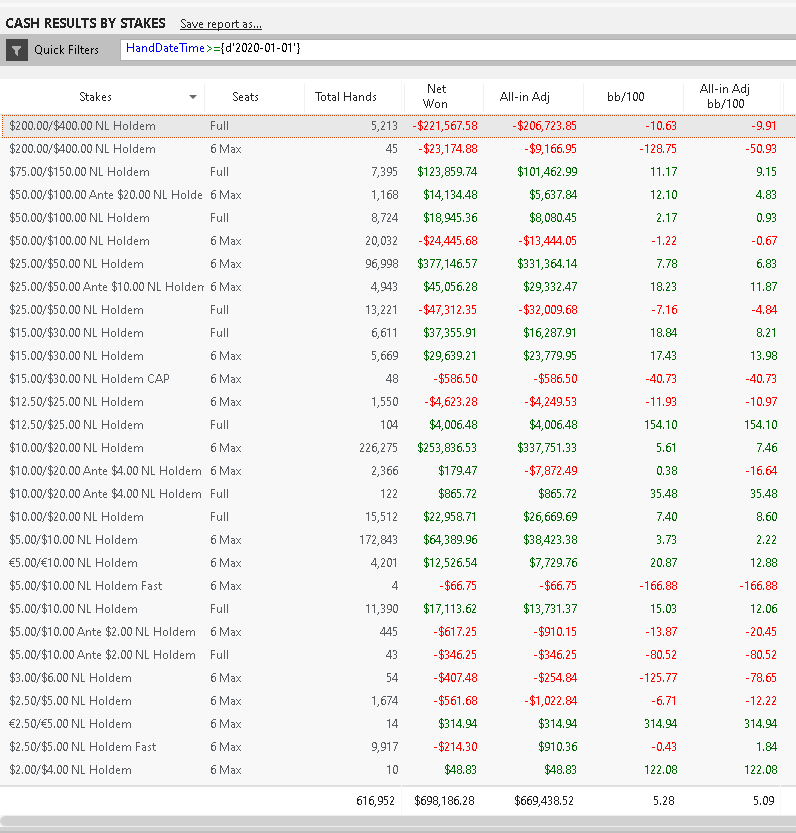 Alexey's results for the last two years excluding GG
Alexey's results for the last two years excluding GG– At what limits did you first meet with Linus?
– You can say that I am the reason why he ended up at the high stakes. With him we played a huge number of regwars, starting from NL1k. I was already actively playing this limit, and he had just arrived. It’s a similar story with Stefan, but we often didn’t have the same playing time, while Linus played clearly in my time. The first time we met was on Chico Poker Network, then there was completely different software. For some reason, Linus started playing in this particular room, and then the country was not written in full, but as an abbreviation. It had "CH" and I thought it was some Chinese guy. Only later did I find out that this is the abbreviation for Switzerland. At first, he had average results, he played rather poorly, breaking even. Then he appeared on 888 under the nickname "Deepz" and began actively regwaring. His game was very exploitative and telephonic, he called 4-bets with all sorts of garbage and did not fold anything to raises. We did this for a while. And this is where the very story I mentioned before happened. Then he started playing for us. Linus got into shape very quickly, literally in 2-3 months. I think after that we all played a significant loss. Personally, I lost 30 buy-ins to Linus at NL2k on Stars and 888. Thus, we sponsored him into a bankroll at NL5k, where he already showed a master class to others.
– What is the reason for such progress in his game?
-- His game changed a lot. He quickly eliminated mistakes he was making early on. First I got rid of the roughest ones, then I started adding my own signature features. He understood very well the concept of realizing equity, that is, how to get value from his different groups of hands. He understood this much better than the players of that time. Some of his actions looked exploitative, for example, he played a continuation bet and folded to a raise 15% of the time. At that time it was considered a leak. And he simply had his ranges built in such a way that he checked groups of hands that were vulnerable to a raise. Gradually he rearranged the ranges and got rid of these mistakes. He improved due to his advanced technical level and work away from the tables. I already understood this after the fact from his interview, because it coincided with the period when he locked himself in Malta and worked tirelessly on the game. He played a decent amount of heads up and beat all his opponents. Angryogr and I, and several European regs probably suffered the most. At some point, he became the best in any lineup, and they continued to give him action. Although in those days they gave it to everyone. Even if we knew that he was the best, we would still continue to play. He filled his bankroll and had a successful shot at NL5k, where he beat 1nvoker, and then the high stakes began.
– It seems that Linus is considered the most striking example of a person who rose up thanks to solvers. Is this really true?
– Don't think so. I'm sure that this is a myth. The performance of all the elite players of that time was far from optimal. This is even more true for the Baron, which is often said to be a GTO wiz. In fact, people just don't know what they're talking about. Baron played incredibly exploitatively, he simply had a polished and logical game. Linus partly does the same. Even his relatively recent game, for example, 2018, is also very exploitative. He, of course, worked in solvers, but then all the top players worked, we are no exception. But if you don’t know how to work in a solver, it won’t improve your game. Playfulness and intelligence are more important, Linus is simply very smart. He, Baron, and, probably, Timofey Truteller Kuznetsov are typical Olympic athletes; they can dig very deep in their field.
– How did public solvers influence the development of poker? Did they really become a revolutionary product?
– Solvers have changed the set of qualities required by elite players. They have more talent before. I don't like this word, but it fits here. His influence was higher, and now discipline and hard work are more important. Back then, all this was also incredibly important, but because of the solvers, the balance shifted a little. Solver is a tool that can greatly improve your game if used correctly. But none of the current top 5 need a solver. Before them, there were also tools that made it possible to find some semblance of an optimal game. For example, CardRunners EV, in which I myself spent 200-300 hours. Even earlier, people created tables in Excel.
But there were no illusions. As soon as Simple Postflop fell into our hands, and this happened almost immediately, we immediately realized that it was an incredibly powerful tool. Jayser and I immediately started working with Simple, but it’s clear that at first, we did it clumsily. We tried to understand why some groups of hands are played this way and not otherwise. In general, any poker software is very overrated. Nowadays amateurs are very afraid of solvers; before they were afraid of HUDs. But if none of this had happened, the nerds would have beaten the amateurs in the same way.
– That is, the solvers had no effect on the losses of amateurs? Have they changed the top win rates?
-- They haven’t even changed that, there are still some preparations and runs, but these things don’t go away. Yes, you don’t know the best solutions or the optimal concepts, but you know other concepts that work just as well. The main thing is to understand what exactly you are doing and why, the game should be logical. If a strong professional has a good base game, then the solver and HUD have virtually no effect on it. Yes, this also applies to weak regs, and for some, they can even interfere.
– You and Jayser got a solver in 2015? Some players are a few years early. Alex Millar said he paid a 6-figure sum.
– And, according to him, it paid off. But I'm sure he overestimates it himself. Back then no one knew how to work with such software.
– So the regs who received solvers a year or two before you didn’t earn much from this?
– I am sure that this did not affect the balance of power in any way. Discipline and work have always been key. Stefan (Burakov) is a good example; he started working in the solver much later than Jayser and I. At the same time, Stefan grasped some concepts that I had difficulty grasping on the fly. There is a lot of imitation in poker – everyone does something, so I should too. Someone started 3-betting with an increased size, and everyone repeated. Some concepts were reached in this way, while others were reached by working outside the tables and using logic. The solver of those times gave practically nothing. Now the situation has changed a little, experience has accumulated, and people understand how to work – how to tweak certain adjustments, they are trying to find weaknesses in classic strategies. Today, a person who uses a solver very well can really gain an advantage. But to be honest I don't even know such people. The game of all the current elite is very exploitative. All of these players are incredibly strong for a variety of reasons, and working with software is just one of them.
– Is Linus still among the elite? It seems that ironic comments towards him are happening more and more.
– He is a very interesting player. I repeat that in my opinion, he is simply an incredibly smart person. This probably sounds like a primitive explanation. But a smart person gets in shape faster, figures out what’s what faster, and has a better memory. These may all seem like small things, but they have a big impact. I remember very well my hands from 2011 that brought me negative emotions, even at NL25. Sometimes you start discussing a great hand with the person you played it against, and he says that he doesn’t remember it at all.
When Linus returned in November, I saw him play on tilt for the first time. It is clear that this happened to him in his youth, but I have never seen this before in the latest Linus. He went beyond ranges and played tilted bad hands at NL40k. But, as usually happens, he very quickly corrected all his mistakes. Already in December, when active games with ImagineKing began, Linus, as expected, became the top. He is definitely in the top five now; it’s unlikely that anyone will argue with that.
– Does the fact that he plays heads-up with Berri Sweet prevent him from switching to 6-max?
-- Of course, this was partly the reason for his blunders in November. We played one NL40k table, where the only amateur was also playing quite advanced. It didn't even always have full tables. And Linus played heads-up or Omaha at the same time; with this approach, it is impossible to give out the A-game. I think he even played at a disadvantage in some lineups. But when the game became a lot and he became interested, he focused his attention and immediately got into shape.
This is a very interesting topic. Because there is another player – Stefan, who has a very big difference between his A-game and the rest. His match with Wiktor Malinowski became a real masterpiece for me, and I knew in advance how it would all end. Stefan often sat down with the regs on tilt to play heads-up... In general, he is the kind of person who can play 10 tables of heads-up with different opponents and at the same time watch something in the browser. At such moments his performance may be poor. But it’s a completely different matter when Stefan comes to play against you purposefully, without being distracted by anything. And then Wiktor fell behind. He had the wrong impression of Stefan and his approach because he had previously been having fun and jumping in to play with him in a suboptimal state. Sometimes even in 3-max he played like garbage. Here, probably, even Katya is more to blame, he rated Stefan very low and clearly underestimated him. And then it just so happened that the match took place and a lot of money was bet on it. They played NL20k, but it seems to me that Wiktor played 100k or even more, because the crossbook prices were crazy. And no one expected such a takeaway. Someone might have the opinion that Wiktor does not know how to play. Naturally, this is not so, and he is also among the great players. At some point, he reached the peak of his form, with a very strong heads-up game, and won the match against Pedro "moglimiranda" Miranda, who was then recognized as the top player in heads-up. Wiktor played a great long match against him and ultimately came out ahead. In 6-max, Wiktor also showed a good level of play and acted like clockwork. I beat my main partner at that time, Sergey "Munez" Nikiforov, several times. We analyzed each spot, and studied hand after hand of heads-up, They thoroughly analyzed Wiktor's game and tried to come up with something to make Munez fight back. It is clear that he made some adjustments, the game was still exploitative, but overall Wiktor showed a very good level.
That's why I was even afraid to bet on the match against Stefan; it was not obvious how motivated he would be. But the stars aligned so that Stefan approached the challenge with maximum motivation, Wiktor could not withstand such pressure, and his game fell apart. After that, it was clear that he was playing on passive tilt. To be honest, I think he lost almost half of his bankroll or even more. He immediately started playing cheaper, and then he signed a contract with GG, which he had not been interested in before. I jumped to NL5k at 20bb tables, which is not mathematically challenging at all. But then I went to live poker, won a $100k tournament in Cyprus, and made it through. After that, apparently, he relaxed a little and got into shape. Now Wiktor is playing very well again.
– He rose up much later than the others?
– Yes, but Wiktor has always been a very ambitious player. I remember his journey from the time he played NL200 on 888. He sometimes jumped to us on tilt at NL2k, the game was organized around him. He wrote in the chat that he only had three buy-ins, and he allocated one for the game with us. It’s hard to even call it shots. But then he very quickly went from amateur to reg, he was simply inclined towards poker, young and smart. As far as I know, he also has friends who play well, they helped him outside the tables. Wiktor quickly filled up his bankroll and secured a high-stakes position. And he rose much faster than Linus. He somehow immediately passed everyone, and then his famous interview came out, where he called himself the top player at NL2k.
I remember Jayser was furious after that, haha. The regwars then gathered under Wiktor, and he suddenly called himself the best. But then Wiktor also joined the small group of players who started the regwars as underdogs, and in the process became favorites. This is an exception to the rule. Unfortunately, there are many more examples when a person starts to fight as an underdog and loses his entire bankroll.
– Have you ever played heads-up?
– A long time ago. I even played a match with Stefan when he joined me on Full Tilt. I enjoyed playing one-on-one, but then I got hit hard by bots on Chico. They showed me and some other regulars where our place was. From that moment on, I am more cautious about heads-up, but sometimes I play. I even have several victories in such matches, they are not very big, but important for me. There were matches in which I won almost the entire bankroll over my opponents. It just didn’t happen at the highest limits – NL1-2k. I haven’t played any really expensive HU matches; I prefer 3-max matches. Here I’m ready to play even as an underdog because I get a lot of pleasure. So in December, there was a random match with Stefan, who was sitting in the lobby and wanted to play, and with Alexander "Alexz1z" Serguti. He seemed to have lost at lower limits and came to play with us.
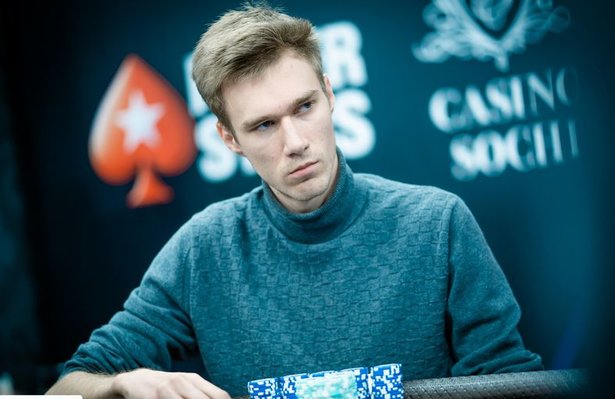
The match turned out to be very juicy, I haven’t felt such pleasure from a game for a long time. In the end, you are just exhausted – your head is pounding, and you are at the maximum of your abilities. It’s hard to convey, but many people probably know the feeling when you’ve given your all physically and your brain is working at full capacity. Truteller said that he had such a feeling after school Olympics. And after chess or regwars in poker. You think about every situation – how to identify ranges, how to realize equity against a specific opponent. This is all very interesting and a pure thrill for the player.
Why, for example, is it difficult for me to end my career? It’s not that I tried very hard, but such thoughts happened. Sometimes you get the feeling that you are degrading, you are not giving your best, your brain is not working at its best, and you are not giving your all to the game, no matter how stupid it may sound regarding poker. But the problem is that it will be almost impossible to find similar emotions in anything else. In any other area, you will have to figure it out from scratch. And forcing yourself to learn something new is incredibly difficult. In poker, I already know something and I can experience this feeling even if I lose the match. This is probably why old heads-up players sometimes come back to the lobby and throw in a ton of money. For example, "wilhasha", also known as "Denoking" on other sites. It's a kind of drug that you become addicted to.
– When did Wilhasha return?
– Many times, he even played 3- and 4-max, but as an outright amateur. Of the latest returns, the most notable is Robert Flink. Now he has probably gotten into shape, but when he first appeared he was unlikely to be very good. I analyzed his matches, it’s really bad.
– He played with Artur Martirosyan?
– Yes. Arthur is, of course, a strong player, but if Robert had chosen the same Wiktor or, god forbid, Stefan at the peak of his form as his opponent, then everything would have ended in disaster.
– What is the reason for all these heads-ups? Ego? Does Flink not understand that he is worse than Wiktor?
– Yes, ego. And he just wants to play. He still didn’t play with Wiktor, he tried to cover up his weaker opponents. Although I also played with Wiktor when there were no other opponents at all. As far as I know, Robert has quite a lot of money, and clearly, he’s not playing with the last of it. It is unlikely that he has the motivation to bounce NL1k.
– Did Munez have something similar? You say that his direct goal was to beat Wiktor.
– Yes, he had little control over himself, but he still did it for the bankroll. Munez is a rare representative of the regs who have a very stable game, even his worst poker is not much different from his A-game. He wanted to play more bigger stakes, and it is very difficult for such players to admit defeat. Maybe he will also beat Wiktor; it is unlikely that they have put an end to their match. But partly this is all ego, no matter how loud this word may sound regarding a player of this level. He just couldn’t stop, and then he regretted it. They also played for 20 hours straight. And if you want to beat Wiktor, you can come up with a more rational way.
– Have you ever had problems with ego or tilt?
– Never, I have a very stable emotional background. Of course, I make mistakes, and I also have suboptimal sessions, but in my entire life, I have never called an opponent a swear word. I am always as calm as possible. On the one hand, this is my strength, but at the same time, it is my weakness. When you yourself do not experience such emotional fluctuations, you are less likely to notice them in your opponents.
– Have you ever had periods of burnout when you didn’t want to play poker at all?
– Never either. I was lucky that there was never a time in my life when I needed money to survive. I quickly developed a large bankroll, and if I didn’t want to play, I didn’t play.
– What was your longest period without poker?
– About two months. It's not much, but it's not little either. As a rule, this involves some kind of travel. You vacation in the Maldives, then you return and you don’t want to sit down right away, you watch TV series for a few more days, chat with friends, and your vacation is extended. There were also months when I played 20,000 hands, this happened regularly.
– Does it take you a long time to get in shape after such pauses?
– I have a specific recipe for how to do it faster. I play weaker lineups, go down the limits, I can even play around, but at some NL1k. I play fewer tables thoughtfully and devote more time to off-table analysis. Throughout my career, I have always had a lot of conferences. I have never shied away from communicating with low-stakes players. Even now I have friends who play NL100, I can go to them to sort out hands. All this helps to get in shape. Antokha had problems with just this, and this is partly why he could not fully open up. At his peak, he was incredibly strong, something close to Baron. But after a long break, I couldn’t return. These people usually have incredible egos and simply cannot afford not to give someone a fight. The same Stefan can’t help but play regwars, it’s impossible to imagine so he starts selecting. Stefan either plays with everyone or doesn't play at all.
– When you started playing, did you immediately set yourself some kind of goal?
– First, the most basic one – to make money. I don’t have a very rich family and I just wanted to provide for myself. But quite quickly, somewhere around NL50, a competitive component appeared, and in the future, this became my main motivation. The stories of Forhayley, Jayser, 1nvoker, and so on – they are all, first of all, about competition, money is secondary here. It’s clear that if I get into some very good lineup at NL2k, I’ll play it well for 15 hours. But money was never the main goal. I remember well the moment when I received the coveted million dollars. It seemed like I could even end my career. But you quickly realize that you can’t do anything else. Everyone around us plays poker, they only talk about poker. You take a short break, but gradually you still get back into it. Dependency is a bad word.
When you get a confident bankroll, you lose the fear that you won’t have anything to live on. It happened very quickly for me. Apparently, due to the fact that my family is not very rich. When I got $200k, it seemed like I had enough to last me a lifetime and I could do whatever I wanted. I just sat down and played, the main thing was that losing wasn’t super painful. There is a saying that the biggest losses are yet to come. And if you can already afford to lose a huge amount of your bankroll, then everything is going well in your life.
– What is your lowest limit now?
– NL2k. November was very successful, but in December I lost quite a lot and decided to take a short break. And when I later got into shape, I joined the regwars even at NL1k. I don't see anything wrong with that if no one wants to play higher.
– Is there a lot of action at high stakes now?
– There aren’t very many high-stakes games, but you can find action if you want. There is quite a lot of play on ACR on 10bb tables, and on GG it’s also quite good. True, the game there is difficult and with a high rake load, but it’s there. Nowadays, of course, it is more difficult to find a good game than in 2014-15. Unfortunately, all changes in online poker are made to the disadvantage of professional players. The rake is growing, traffic is being diverted to related games, and it is becoming increasingly difficult for an amateur to make a deposit.
– Tell me, what is the danger of scripts? Why, for example, Manuel "J0hn Mcclean" Saavedra is hated by all regs?
– For amateurs there is no difference, beginners should not be afraid of this. But you need to understand that if some rich person wants to play expensively, he will be opposed by the best. I recently played live in Sochi and was asked if the game on Stars is fair. I said that it was absolutely honest, but I would have to play with the strongest players in the world.
– Is it possible to somehow quantify how many extra bb/100 J0hn Mcclean gets through his actions?
– For myself personally, a lot. There is a fairly large pool of regs who do not run tables but try to sit on them. And the script makes it possible to get the game when it’s convenient for you, and you don’t need to waste energy and concentration. Although in fact, the script is also a double-edged sword. When they were allowed, the games were even weaker because weaker players also got a seat at the table with an amateur. For the most elite players, the script has never been a problem, but for second-tier players, it takes up a lot of waiting. Let's say there is a very strong Russian reg on Stars. He sometimes regwars, sometimes selects. At the tables, he has the same expectation as McLean, but in a year he will win five times less because McLean always gets the table first. That is, a regular who uses the script takes away the anticipation from his colleagues/competitors. It's clear, that the rest are unhappy, but other than public censure there are no methods of struggle. Unfortunately, there are now a lot of such semi-fraudulent schemes in online poker and it is not clear what to do about it. But we can’t reconcile ourselves, all that remains is to make it public. J0hn Mcclean plays dishonestly on many sites and uses prohibited software to get into the game. Is he the only one? Obviously not. A fairly large pool of players cheat this way.
– Are bots still the main danger online?
– Yes, bots are an absolute evil, because you get an unfair advantage right at the table. The script still only gives you the opportunity to get to a good table; you still have to play yourself.
– Do modern bots play at the level of the best regs?
– Let me tell you in detail how it all works so that people understand. There are certain spots where bots play very well. These are all heads-up pots, for example, 3-bet pots SB against the button and so on. There are spots that they play worse, for example, with very low SPR, 4-bet pots, or multiway pots. In such situations, great demands are placed on the operator. If a strong player is placed in this role, then everything will turn out well for the scammers. And if the operator is completely far removed from poker, then everything will be bad. The most dangerous combination is a strong reg plus a hint. There was a wild story at 888 when people who didn’t know the rules of poker were put in charge of bots. They played heads-up, but a bug was quickly discovered in their calculations. They defended exactly the same against 3bb raises and against all-ins. That is, they called pushes from SB with the same range, the same as regular raises. This was quickly noticed; some players managed to take advantage of this and won handsomely against them. The most interesting thing is that these nicknames are still playing, that is, 888 hasn’t even banned them. What I mean is that some rooms absolutely don’t care about bots. There are platforms that are trying to fight – Stars and GG. GG recently banned a huge alias of bots from MTT.
– You said that you yourself suffered seriously against bots. Even then did they play stronger than the regulars?
– Such heads-up bots appeared in 2015-16. This is the same bot that Gipsyteam forum member "Uran" wrote to beat other bots. And in the end, he beat his friends. I can tell you a completely ugly story. Another member, "Bigbadmouse" turned to my friend Maxim for help and said that his game at NL200 was not going well at all. Maxim trained him, and after some time, Bigbadmouse sat down with him at NL1k with a bot. And it is impossible to beat him, there is no evidence, only circumstantial evidence.
Unfortunately, in Chico and Chinese rooms, the game was very dirty at that moment. Then 6-max bots appeared. Now the situation is not as bad as in 2015-16. Now there are ways to identify them. But there are still nicknames about which everyone is sure that they are playing dishonestly, but no one can ban them. The good thing is that these are isolated cases.
– In that situation at Chico, did you not immediately realize that you were not playing with a person?
– Quite quickly. But in 2015, it was hard to believe that you were about to be torn apart. Then there were already bots in 6-max games on Stars. The bottom line is that employees of the closed Absolute Poker and Ultimate Bet sold a huge amount of hand history with open cards. Using this data, they wrote a bot that played very exploitatively. It appeared on Stars, a large coalition of players used it, they played for about six months or a year, won a lot, withdrew something, and then everyone was banned. The bot played at 10bb/100, but the elite regulars beat him confidently. That’s why at Chico, at first, we weren’t sure that the bots were that strong. I wanted to play with them, take a closer look, and understand what they are capable of. It turned out that our level at that time could not beat them.
– And you also took part in the games with Ben Affleck? What was the problem there?
– Yes, I know this story well. No one played against him with bots, but it was impossible to get to the tables with him. At some point, I even stopped trying when I saw Ben sit down. Because one day everyone who was at the table with him received warnings about the script, even if the person did not use it. But in general, there was a real hunt for Affleck. Moreover, he played completely uncomplicatedly, always opening four tables. Therefore, when he appeared after the first, everyone understood that he would add three more. Regs ran to open tables before him, no special intelligence was needed here. Many were eventually banned by ACR for bumhunting him, some unfairly. I got off with a warning because one time when Ben arrived, he also opened a second table, and he and I ended up at it at the same time. After that, I began to ignore him altogether. When Ben arrived I was just closing the tables. The account is not worth the risk. However, some people disagree with this.
They play fair with Ben, he just plays frankly poorly. He presses buttons to his heart's content and chases draws. He hasn’t appeared for a long time, and there was a period when he played for four months without a break. He lost a total of four million. True, about 100 people were hunting for him, if you divide it between everyone, it’s not that much money, plus there’s also a huge rake. But he helped many build bankrolls, the best players received decent amounts.
– You said that from the very beginning of your career, you constantly communicated in groups and worked with partners. Don't you like working on your own at all?
– This is how it happened historically. And I believe that this is the most correct way. When people ask me for advice, I always say that the poker environment is the most important thing. But the main thing is not to overdo it, it is best to work in groups of 2-3 people, any more will be a farce. Throughout my poker life, I have worked with someone. First, there were coaches, then conferences of regulars, and then I sorted out hands with my partners – Jayser, Angryogr, Munez. We analyzed hands for logic or analyzed specific spots, analyzed a complex reg. The efficiency of this will not always be high, but you still think about poker all the time that is spent on analysis away from the tables. If your memory is well developed, your concentration and poker thinking will improve. So this kind of work is definitely not a minus. And for me it's just more fun, to be honest.
– Is it important that your partner plays at comparable limits?
– I had partners both stronger and weaker. There is nothing wrong with bringing a person up to your level. It’s just that if the gap is absolutely huge, then a constructive analysis will not work. You'll get a workout. There is nothing wrong with this either, but this is already possible only for altruistic reasons. And if one plays high stakes, and the other plays a strong NL500 reg, then there will always be something to discuss. A high roller should never wear a crown. I have been playing for 11 years and have seen this from my own experience. People with big egos are often very opinionated. And this is not a bad quality, on the contrary, it is even useful. The same Jayser often branded players – clearly the person does not understand what he is doing. Usually, he was right, the person really did not understand anything. But sometimes it turned out that Jayser and I didn’t understand anything, and the person we were playing understood at a higher level. Therefore, you should never speak too categorically about someone else’s game, especially when the player still backs up his actions with good results.
– Have you ever been approached for coaching?
– I coach practically no one for money. I usually agree for two reasons – either this is a person from my social circle and I want to help him, or you are discussing something and the interlocutor clearly does not understand some concept. Then I am also ready to explain in detail. That is, my training also took place for altruistic reasons.
By the way, it is very difficult to teach people completely from scratch. Much more difficult than it seems. It will be difficult to reveal my strengths to a complete beginner, who will need the most basic things explained. It’s like in chess, a child is better taught by a children’s coach, and not by a strong grandmaster. It is clear that I can also teach a player with NL10 something, but it will be unproductive.
– Do you think anyone can be taught to play with a nominal NL200 profit? Could it be that a person really wants to succeed, and tries hard, but it’s just not given to him?
– It happens. This does not mean that the person is stupid, but poker is not for everyone. A very highly specialized set of qualities is required. Some people don't fit the mold. One of my friends, with whom we sorted something out together, has now achieved good success in the IT field. And before that, for many years he really tried to achieve something in poker, but he never rose above NL50. It seems to me that he had a problem with concentration. This is the skill of focusing your attention on specific things for a long time. This is quite difficult, but you can also work on it and improve it.
By the way, it’s probably noticeable from the interview that I’m the kind of person who pours out a stream of thoughts to someone, and then lets him figure it out on his own. This is a very important quality for a poker student. You bombard the coach with your thoughts and questions, and he only has time to answer – here is a mistake, here's what's wrong, here's what's bad. It helped me. And when I taught someone myself, I often saw that it was impossible to get anything out of a person. He’s just silent, and you’re always telling him something. And it is completely unclear how useful this is. You should always try to talk a lot, offer some of your own lines for hands, and discuss what you are doing and why. Let him even be ashamed of his thoughts if they are stupid and not at all profitable. A more experienced partner will quickly correct mistakes, and you will feel better.






